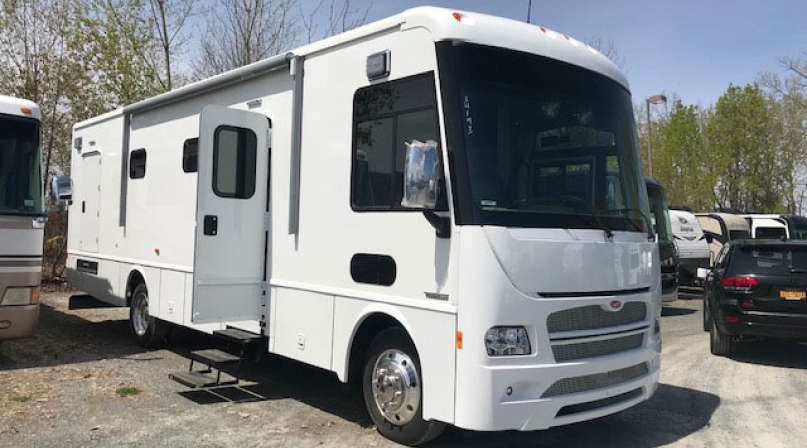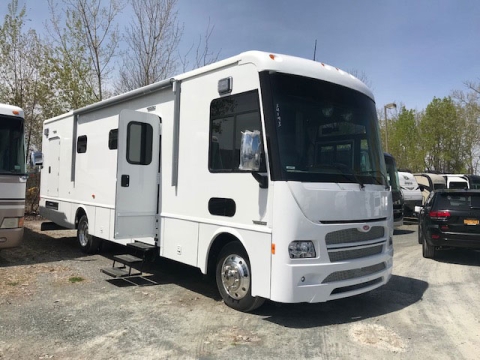Child advocacy center gets its wheels
Author
Upcoming Events
Related News

Key Takeaways
A new child advocacy center in Delaware County, N.Y. is on the move.
The county is the first in the state to receive a mobile child advocacy center to enhance services for children who have been abused.
The mobile unit is funded through a partnership between the New York state Office of Victim Services and the state Office of Children and Family Services as part of a $4.45 million investment by the state. Delaware County’s unit is one of seven being funded through the partnership.
The Delaware County Department of Social Services received $250,000 to purchase the mobile unit and will receive $50,000 annually for three years to cover maintenance costs.
The mobile center is operated by Delaware Opportunities, a community action agency that receives funds and works closely with the county’s Department of Social Services.
Since its opening on June 1, the mobile unit has worked with 16 cases, helping 26 children as of early August.
“It’s truly a ‘if you build it, they will come’ situation,” said Stacy Osborn, director of Safe Against Violence, one of Delaware Opportunities’ programs that provides services for victims of abuse. The new mobile center is part of the program.
The unit is a renovated 28-foot Winnebago that is designed specifically for child advocacy purposes. The RV is set up with an interview and observation room that includes video equipment to record interviews, a waiting area, bathroom and kitchenette.
New York is the first state where Winnebago custom-built an RV to be used as a child advocacy center.
“They’ve taken the regular footprint of a family RV and scratched that,” Osborn said. “It’s really been retrofitted to make it useful as an office as opposed to what most people think when they walk into an RV.”
Delaware County does not have a fixed child advocacy center location. Osborn explained that the county is very rural and does not have public transportation; the mobile center provides services to families who would be unable to get to a physical location.
Before the mobile unit, if a child was a victim of abuse, they would be referred to a child advocacy center outside the county, explained Shelly Bartow, executive director of Delaware Opportunities. In this situation, a family may have to drive several hours to get to the center and then go through the interview process after making the trek. Additionally, local cases would get top priority, meaning others from outside the county would get bumped.
“Rather than taking a long time or not at all, now families can get in within 24 hours for these services,” Bartow said.
The RV, which may be parked at the Delaware Opportunities offices to provide accessibility for families who live close by, has the ability to travel to other communities to reach clients.
“When time is of the essence, we don’t have to transport them 45 minutes to our office or to a freestanding facility,” Osborn said. “We can bring it to them and we’re there and able to interview them within 10 minutes of them knowing that we need to talk to them.”
When the RV travels to a community, Bartow said it stays in publicly discreet areas.
“It’s really designated for specific areas and we can transport people to the RV,” she said. “It doesn’t park in anybody’s driveway.”
Osborn added that the mobile unit can travel to private, child-friendly locations where not everyone will be able to see where it’s parked.
“We’re not an obvious building with a sign out front where people are like, ‘Oh, I just saw that kid go in there,’” she said.
Bartow said the main purpose for the mobile unit is to reduce the number of times a child has to repeat their story to different service providers.
“All the parties that would need the information can get it either by observing the interview or by reviewing the recording and this traumatized child doesn’t have to repeat this story five, six, seven times,” Bartow said.
In addition to making a situation more traumatizing to a child by having them repeat a story, Osborn said children often leave out details of their stories when they are repeating them multiple times to multiple people.
“By doing the interviews as a team, we have one person doing the interview and then other team members can observe the interview via closed circuit recording systems,” she said. “It just makes the whole system much more seamless.”
The mobile unit has been helpful to service providers who are now able to collaborate and be on the same page when it comes to different cases, Osborn said.
Bartow said she sees more agencies across the country providing mobile services when it comes to child advocacy programs.
“For a county like Delaware County, we can’t wait for people to come to us for services. They can’t get here. There are just too many barriers,” Bartow said. “The ability to be able to provide a mobile service to people and take the services to them is really huge.”

Attachments
Related News

County Countdown – Dec. 15, 2025
Every other week, NACo's County Countdown reviews top federal policy advocacy items with an eye towards counties and the intergovernmental partnership.
Stretching small opioid settlement allocations helps funding do more
States and localities are set to receive $56 billion in opioid settlement dollars over an 18-year period, but not every county that receives settlement funding will get enough to build out infrastructure.
